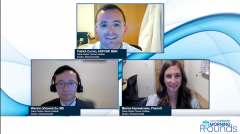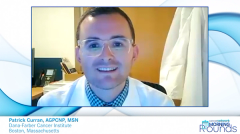
Evolving Treatment Landscape of Clear-Cell Renal Cell Carcinoma
In closing, experts share clinical pearls on open communication with patients, dose reduction strategies, and the relevance of treatment holidays for improving quality of life in patients with renal cell carcinoma.
Episodes in this series

Summary:
In the context of a patient progressing through various lines of treatment for metastatic kidney cancer, the available therapeutic options in the current FDA-approved landscape are explored. Lenvatinib plus everolimus and single-agent everolimus emerge as potential choices for fourth-line treatment. However, lenvatinib plus everolimus requires patients to maintain good ECOG performance status, making it unsuitable for everyone. The response rate to single-agent everolimus is modest, ranging from 3% to 5%, highlighting its suboptimal efficacy.
The discussion then shifts to the future of metastatic kidney cancer, acknowledging the existing unmet needs in the treatment landscape. Despite numerous available medications, disease progression remains common, emphasizing the necessity for strategies that enhance cure rates in the first-line setting. The emerging focus on variant histologies, such as papillary and chromophobe renal cell carcinoma, underscores the need for targeted trials to guide treatment decisions effectively. Looking ahead over the next 5 to 10 years, the discussion delves into promising developments. New drug categories, including HIF-2α inhibitors, immunotherapies, and checkpoint inhibitors like LAG3 and TIGIT, are discussed. The revolutionary application of mRNA vaccine technology for tumor-related peptides is highlighted, showing early efficacy signals in renal cell carcinoma (RCC) and melanoma. Cellular therapies, such as CART cells, are entering phase 1 trials for kidney cancer, showing early signs of efficacy. Triplet therapies and the importance of clinical trials in improving overall survival are underscored.
The transcript also anticipates upcoming trials, such as COSMIC-313, KEYNOTE-918, and studies involving combinations like lenvatinib plus pembrolizumab and belzutifan, providing insight into the evolving landscape of first-line treatments. Additionally, LITESPARK-005, comparing belzutifan to everolimus, is discussed, showcasing the potential for a shift in the standard of care in refractory RCC. Other trials, like TIVO-II and KEYMAKER-U01 2, exploring tivozanib combinations and novel immune combinations, contribute to the evolving landscape of kidney cancer treatment.
Summary is AI-generated and reviewed by Cancer Network editorial staff.
Newsletter
Stay up to date on recent advances in the multidisciplinary approach to cancer.










































